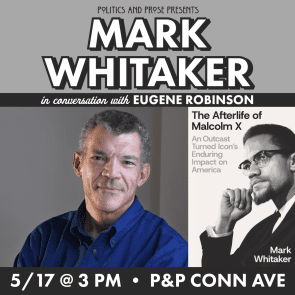
- This event has passed.
The Afterlife of Malcolm X: An Outcast Turned Icon’s Enduring Impact on America
May 17 @ 3:00 pm - 4:00 pm

Malcolm X has become as much of an American icon as Abraham Lincoln, John F. Kennedy, or Martin Luther King. But when he was murdered in 1965, he was still seen as a dangerous outsider. White America found him alienating, mainstream African Americans found him divisive, and even his admirers found him bravely radical. Although Ossie Davis famously eulogized Malcolm X as “our own Black shining prince,” he never received the mainstream acceptance toward which he seemed to be striving in his final year. It is more in death than his life that Malcolm’s influence has blossomed and come to leave a deep imprint on the cultural landscape of America.
With impeccable research and original reporting, Mark Whitaker tells the story of Malcolm X’s far-reaching posthumous legacy. It stretches from founders of the Black Power Movement such as Stokely Carmichael and Huey Newton to hip-hop pioneers such as Public Enemy and Tupac Shakur. Leaders of the Black Arts and Free Jazz movements from Amiri Baraka to Maya Angelou, August Wilson, and John Coltrane credited their political awakening to Malcolm, as did some of the most influential athletes of our time, from Muhammad Ali to Kareem Abdul-Jabbar and beyond. Spike’s movie biopic and the Black Lives Matter movement reintroduced Malcolm to subsequent generations. Across the political spectrum, he has been cited as a formative influence by both Barack Obama–who venerated Malcolm’s “unadorned insistence on respect”–and Clarence Thomas, who was drawn to Malcolm’s messages of self-improvement and economic self-help.
In compelling new detail, Whitaker also retraces the long road to exoneration for two men wrongfully convicted of Malcolm’s murder, making The Afterlife of Malcolm X essential reading for anyone interested in true crime, American politics, culture, and history.
Mark Whitaker is the former editor of Newsweek and the first African American to lead a national newsweekly . He then served as Washington Bureau Chief for NBC News and Managing Editor of CNN Worldwide. Whitaker’s memoir My Long Trip Home was a finalist for the Los Angeles Times Book Prize. His social histories Smoketown: The Untold Story of the Other Great Black Renaissance and S aying it Loud: 1966–The Year Black Power Challenged the Civil Rights Movement were both named among the best nonfiction books of the year by The Washington Post.
Whitaker will be in conversation with Eugene Robinson. Robinson is an award-winning journalist, a political analyst on MSNBC, and the author of three books. As a twice-weekly columnist for The Washington Post, he won the 2009 Pulitzer Prize in Commentary for his columns on the 2008 presidential race that resulted in the election of America’s first African-American president
Can’t attend? Click HERE to join the livestream.
